
Yevgeny Ivanovich Zamyatin, sometimes anglicized as Eugene Zamyatin, was a Russian author of science fiction, philosophy, literary criticism, and political satire.
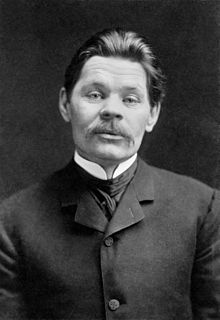
Alexei Maximovich Peshkov, primarily known as Maxim Gorky, was a Russian and Soviet writer, a founder of the socialist realism literary method, and a political activist. He was also a five-time nominee for the Nobel Prize in Literature. Prior to his renown as an author, he frequently changed jobs and roamed across the Russian Empire; these experiences would later influence his writing. Gorky's most famous works were The Lower Depths (1902), Twenty-six Men and a Girl (1899), The Song of the Stormy Petrel (1901), My Childhood (1913–1914), Mother (1906), Summerfolk (1904) and Children of the Sun (1905). He had associations with fellow Russian writers Leo Tolstoy and Anton Chekhov; Gorky would later mention them in his memoirs.
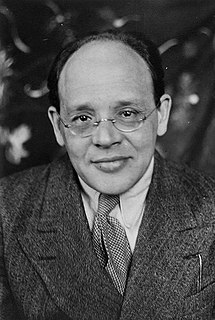
Isaac Emmanuilovich Babel was a Russian writer, journalist, playwright, and literary translator. He is best known as the author of Red Cavalry, Story of My Dovecote and The Odessa Tales—stories from the life of Jewish gangsters from Odessa led by Benya Krik. He has been acclaimed as "the greatest prose writer of Russian Jewry". Babel was arrested by the NKVD on 15 May 1939 on fabricated charges of terrorism and espionage, and executed on 27 January 1940.

Feodor Ivanovich Chaliapin was a Russian opera singer. Possessing a deep and expressive bass voice, he enjoyed an important international career at major opera houses and is often credited with establishing the tradition of naturalistic acting in his chosen art form.

The Tupolev ANT-20 Maksim Gorki was a Soviet eight-engine aircraft, the largest in the world during the 1930s. Its wingspan was similar to that of a modern Boeing 747, and was not exceeded until the 64.6-metre (212 ft) wingspan Douglas XB-19 heavy bomber prototype first flew in 1941.
Enemies is a 1906 Russian-language play by Maxim Gorky. It was published in 1906 in the collection Znaniye, in Saint Petersburg, at a time when Gorky was actively involved with the Russian revolutionary underground, which served as the impetus for the play. It is a recognized as an early work of socialist realism.

Samuil Yakovlevich Marshak was a Russian and Soviet writer of Jewish origin, translator and poet who wrote for both children and adults. He translated the sonnets and some other of the works of William Shakespeare, English poetry, and poetry from other languages. Maxim Gorky proclaimed Marshak to be "the founder of Russia's (Soviet) children's literature."

"Wind of Change" is a power ballad by West German rock band Scorpions, recorded for their eleventh studio album, Crazy World (1990). The song was composed and written by the band's lead singer Klaus Meine and produced by Keith Olsen and the band. The lyrics were composed by Meine following the band's visit to the Soviet Union at the height of perestroika, when the enmity between the communist and capitalist blocs subsided concurrently with the promulgation of large-scale socioeconomic reforms in the Soviet Union.
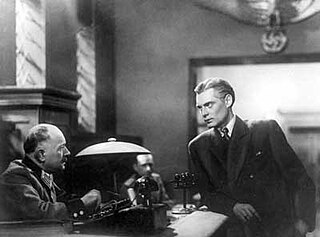
Pavel Petrovich Kadochnikov was a Soviet actor, film director and screenwriter. Among other notable roles he played in the film Ivan the Terrible, directed by Sergei Eisenstein. He received the Stalin Prize three times, was named a People's Artist of the USSR (1979) and a Hero of Socialist Labour (1985).
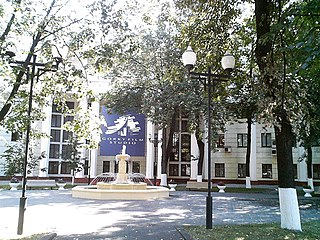
Gorky Film Studio is a film studio in Moscow, Russian Federation. By the end of the Soviet Union, Gorky Film Studio had produced more than 1,000 films. Many film classics were filmed at the Gorky Film Studio throughout its history and some of these were granted international awards at various film festivals.

Neecha Nagar is a 1946 Indian Hindi-language film, directed by Chetan Anand, written by Khwaja Ahmad Abbas and Hayatullah Ansari, and produced by Rashid Anwar. It was a pioneering effort in social realism in Indian cinema and paved the way for many such parallel cinema films by other directors, many of them also written by Khwaja Ahmad Abbas. It starred Chetan Anand's wife Uma Anand, with Rafiq Ahmed, Kamini Kaushal, Rafi Peer, Hamid Butt, and Zohra Sehgal. Neecha Nagar was a Hindi film adaptation in an Indian setting of Maxim Gorky's 1902 play The Lower Depths.

"The Lady with the Dog" is a short story by Anton Chekhov. First published in 1899, it describes an adulterous affair between an unhappily married Moscow banker and a young married woman which begins while both are vacationing alone in Yalta. It is one of Chekhov's most famous pieces of short fiction, and Vladimir Nabokov considered it to be one of the greatest short stories ever written.

The Gorky Park is a municipal park of culture and recreation in the city of Taganrog, Russia.

Yuri Pavlovich German was a Soviet Russian writer, playwright, screenwriter, and journalist.
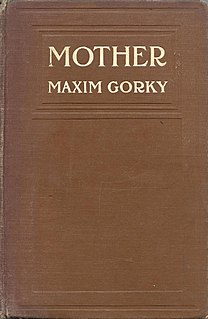
Mother is a novel written by Maxim Gorky in 1906 about revolutionary factory workers. It was first published, in English, in Appleton's Magazine in 1906, then in Russian in 1907.
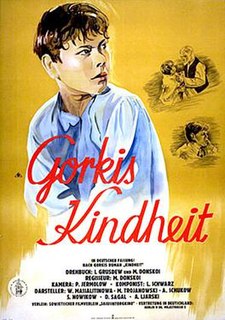
The Childhood of Maxim Gorky is a 1938 biopic based on the first part of Russian and Soviet writer Maxim Gorky's three-part autobiography, My Childhood. The film shows the earlier years of Alexei Peshkov, better known as Soviet's famous Maxim Gorky; it takes the audience through Alexei's experience at his maternal grandparent's home in the town of Nizhni-Novogorod. Alexei interacts with family members, workers of his grandfather's dye factory and local orphan children, all of which impact him.

Dmitry Borisovich Kabalevsky was a Soviet composer and teacher of Russian gentry descent.

Foma Gordeyev is an 1899 novel by Maxim Gorky.
The Last Ones is a 1908 four-act drama by Maxim Gorky.

"Chelkash" is a short story by Maxim Gorky, written in August 1894 and first published by Russkoye Bogatstvo in June 1895. The first of the numerous Gorky stories to appear in this magazine, it made the author well known in Russia and was included in all editions of the Complete Works by Maxim Gorky.

















